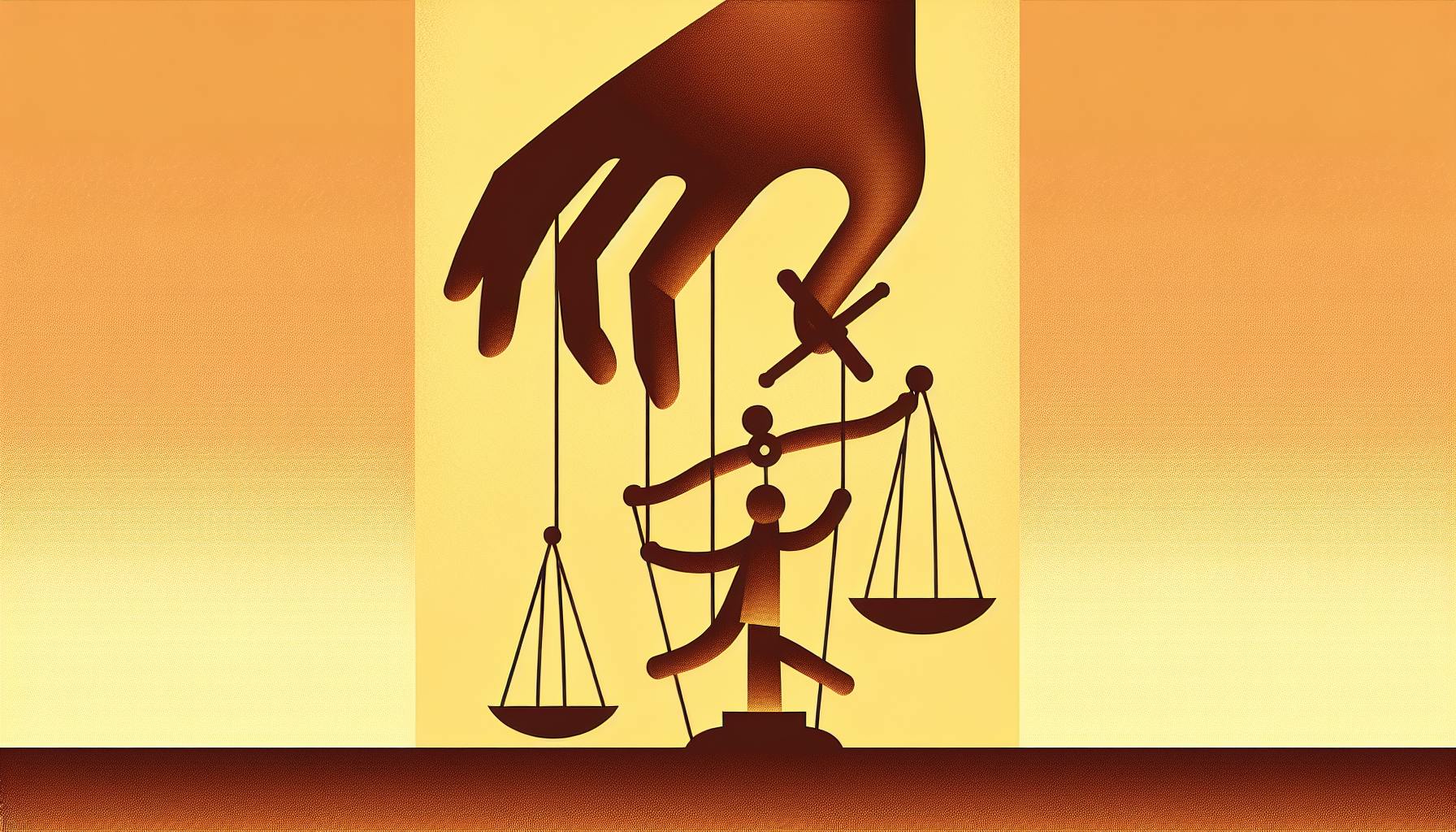Most people would agree it can be challenging to fully comprehend the legal concept of willful blindness.
By reading this article, you will gain a clear understanding of what willful blindness means, how it is applied in criminal law, and what the key elements and defenses are surrounding claims of willful blindness.
You will learn the definition of willful blindness, how it differs from other legal concepts like negligence and recklessness, case study examples of willful blindness in court judgments, and strategies to mitigate risks of willful blindness in corporate governance.
Understanding Willful Blindness in Criminal Law
Willful blindness, also known as deliberate ignorance or contrived ignorance, is a legal concept where an individual intentionally avoids gaining knowledge of illegal activities in order to avoid criminal liability. This doctrine is applied in criminal law, especially in cases involving money laundering, drug trafficking, copyright infringement and other areas.
Defining the Willful Blindness Doctrine
The willful blindness doctrine originated in English law in the 19th century. The doctrine states that if a person has suspicions of wrongdoing and deliberately fails to make further inquiries to confirm it, they could still be held criminally liable. This is because willful blindness is seen as equivalent to knowledge of the illegal activity.
Some key court cases that established willful blindness as a legal concept include:
-
United States v. Jewell (1976): This ruling by the U.S. Court of Appeals for the Ninth Circuit first introduced the willful blindness doctrine and jury instructions in American federal criminal law.
-
Global-Tech Appliances, Inc. v. SEB S.A. (2011): The U.S. Supreme Court upheld the willful blindness doctrine, ruling that deliberately failing to investigate infringement can meet the intent requirement for inducing patent infringement.
So in summary, willful blindness applies when a person suspects wrongdoing, does not investigate further in order to avoid confirmation, but continues to be involved with the potentially illegal acts. This avoidance of guilty knowledge can still incur liability.
The Interplay Between Actus Reus, Mens Rea, and Willful Blindness
In criminal law, there are two central requirements to establish guilt:
- Actus reus: The guilty act itself.
- Mens rea: The guilty mind or intent to commit a crime.
Willful blindness helps establish mens rea. Since the defendant intentionally avoided confirming suspicions, their willful blindness can demonstrate guilty knowledge or intent for failing to prevent or enable illegal acts.
However, willful blindness alone cannot satisfy the actus reus requirement. Prosecutors must still prove the defendant committed guilty overt acts to facilitate the crime. But willful blindness can complement other evidence that the defendant participated in illegal acts.
Willful Blindness Meaning in Banking and Other Sectors
Some areas where willful blindness is commonly applied include:
-
Money laundering: Willful blindness could apply to bankers, accountants or others who ignore suspicious financial transactions.
-
Drug trafficking: Couriers who avoid investigating the contents of packages could still be liable.
-
Copyright infringement: Online services that turn a blind eye to pirated content on their platforms.
-
Securities fraud: Executives avoiding reports of misconduct in their company.
So willful blindness has a wide reach across white collar crime, drug offenses, and intellectual property theft. It prevents avoidance of liability through deliberate ignorance of suspicious activities.
Contrived Ignorance Versus Genuine Unawareness
There is often a fine line between willful blindness as contrived ignorance, versus genuinely not knowing about illegal acts. Prosecutors must prove that willful blindness was deliberate rather than inadvertent.
Factors like the defendant's conduct, control over the situation, and attempts made to investigate suspicions are considered. Genuinely not knowing or being unable to prevent a crime could still absolve liability.
So ultimately, applying willful blindness involves carefully weighing whether ignorance was deliberately engineered rather than innocent. This helps distinguish truly culpable avoidance of guilty knowledge from blameless lack of awareness.
What are the elements of wilful blindness?
The key elements of the wilful blindness doctrine in criminal law are:
Actus Reus
This refers to the physical act or omission of the crime. For wilful blindness, the actus reus is that the defendant consciously avoided confirming suspicions that would have revealed the criminal act or omission.
For example, a bank manager suspects some transactions indicate money laundering but deliberately avoids investigating further. The actus reus is the conscious failure to investigate the suspicious activity.
Mens Rea
This refers to the mental state or intent of the defendant. For wilful blindness, the mens rea is that the defendant deliberately avoided gaining full knowledge of the crime, despite being aware of a high probability of its existence.
In the money laundering example, the bank manager did not have confirmed knowledge of the illegal activity but suspected it and deliberately avoided confirming those suspicions. This establishes the mens rea of wilful blindness.
Concurrence
For criminal liability, the defendant's actus reus and mens rea must occur concurrently. In wilful blindness cases, this means the defendant's deliberate avoidance of knowledge must coincide with the criminal act itself.
In summary, wilful blindness has three key elements - an act or omission of avoidance, awareness of high probability of a crime, and concurrence between the two. Establishing these elements allows wilful blindness to satisfy the knowledge requirement for criminal liability.
What does it mean to be willfully blind?
Willful blindness, also known as deliberate ignorance or contrived ignorance, is a legal concept where an individual intentionally avoids gaining certain knowledge. This concept is used to determine liability or culpability in criminal law and other areas.
Key Elements
For willful blindness to apply, three key elements must be met:
-
There is a high probability that a fact exists. For example, there may be signs of illegal activity occurring.
-
The individual deliberately fails to make reasonable inquiries into the fact. They intentionally avoid confirming the fact despite having reason to suspect it exists.
-
The individual knows there is a high probability the fact exists but avoids gaining full knowledge to avoid liability. Their ignorance is claimed as a defense but is considered willful blindness by the law.
Real-World Examples
Willful blindness has many applications across different areas of law. Some examples include:
-
Business partnerships: Avoiding knowledge of a partner's Ponzi scheme to avoid liability.
-
Landlords: Turning a "blind eye" to obvious illegal activities of tenants like drug dealing.
-
Copyright infringement: Operating a file-sharing site while avoiding confirming the presence of infringing content.
In these cases, willful blindness serves the same function as actual knowledge in determining liability. Claiming ignorance despite deliberately avoiding gaining knowledge is not considered a valid legal defense.
Relation to Recklessness
Willful blindness falls in between negligence, where one should have known about a risk but failed to perceive it, and recklessness, where one consciously disregards a substantial risk. With willful blindness, one suspects wrongdoing is highly likely but deliberately avoids confirming it.
This concept allows courts to impose liability for intentional avoidance of incriminating knowledge that would otherwise be difficult to prove. It depends on proving the individual strongly suspected wrongdoing but intentionally avoided gaining actual knowledge.
What is the claim of willful blindness?
The doctrine of willful blindness, also known as deliberate ignorance or contrived ignorance, allows judges to instruct juries that they may convict a defendant under a statute that requires the defendant to have knowingly committed a crime. The prosecution would need to establish that the defendant deliberately avoided learning key facts that would have confirmed the criminality of their conduct.
For example, if a statute requires a defendant to "knowingly" engage in copyright infringement by selling counterfeit goods, the prosecution could argue that the defendant was willfully blind to the fact that the goods were counterfeit. Even if it cannot be proven that the defendant had actual knowledge, willful blindness to the key facts allows the jury to infer knowledge and potentially convict the defendant.
Essentially, willful blindness occurs when a person suspects wrongdoing is occurring but deliberately avoids confirming the facts so they can claim lack of knowledge as a defense. The willful blindness doctrine prevents this type of intentional ignorance of criminal activity.
By establishing willful blindness on the defendant's part, the prosecution only needs to prove that the defendant should have known about the criminality of their conduct. This lowers the bar from needing to prove actual knowledge.
So in summary, the claim of willful blindness allows the prosecution to convince a jury that a defendant cannot avoid criminal liability by intentionally remaining ignorant of key facts that would confirm the illegality of their actions. This prevents defendants from finding loopholes in statutory language requiring knowledge.
sbb-itb-e93bf99
Which of the following are examples of willful blindness?
Willful blindness, also known as deliberate ignorance or contrived ignorance, refers to a legal concept where an individual intentionally avoids gaining certain knowledge. This concept is used to determine culpability.
Some examples of situations where willful blindness may apply include:
-
A bank manager ignores signs of suspicious transactions that could indicate money laundering by a client. Despite suspicions, the manager does not investigate further.
-
A company executive turns a blind eye to potential copyright infringement within their business. They avoid gaining specific knowledge of infringing activities.
-
A person transports a package for a friend across borders without confirming its contents, despite suspicions of illegal contraband.
-
A supervisor in a company suspects one of their employees may be harassing others or misusing company resources. However, they choose not to look into the matter further.
In these examples, willful blindness means that despite some level of suspicion about illegal or unethical conduct, the individuals deliberately avoided gaining full knowledge of the activities. This intentional avoidance of knowledge could still incur liability under willful blindness doctrines.
However, willful blindness requires more than mere negligence or recklessness. There must be evidence that the person actively and consciously avoided gaining incriminating knowledge, rather than just failing to investigate suspicions through carelessness or mistake.
Ultimately, applying willful blindness depends on the specific circumstances and jurisdiction. But it illustrates how intentional ignorance does not absolve liability in the eyes of the law.
Differentiating Willful Blindness from Other Legal Concepts
Willful blindness is a complex legal concept that is often conflated with other forms of awareness and intent. By analyzing key differences, we can achieve greater clarity on willful blindness and its implications.
Willful Blindness Versus Criminal Recklessness
Criminal recklessness refers to conscious disregard of substantial and unjustifiable risk. Unlike willful blindness, recklessness requires active awareness of the risk. However, willful blindness only requires deliberately avoiding confirmation of high probability of a fact's existence.
For example, a smuggler who consciously chooses not to inquire about illegal cargo exhibits willful blindness. But a reckless driver speeding through traffic demonstrates awareness of the risks. The key distinction is whether the person avoids gaining more knowledge of the offense.
Vincible Ignorance and Its Consequences for Liability
Vincible ignorance refers to lack of knowledge that could reasonably have been obtained. This can make someone liable for a criminal offense through negligence. However, willful blindness requires active avoidance of truth rather than mere failure to inquire.
So while vincible ignorance may be unethical, willful blindness indicates intent to prevent discovery of unpleasant facts. The latter warrants greater culpability. However, both can satisfy the mental state requirements for accomplice liability.
Comparing Negligence to Willful Blindness
Negligence refers to carelessness, often due to ignorance. But willful blindness entails deliberate efforts to avoid learning facts. So willful blindness exceeds civil negligence or even gross negligence in blameworthiness. After all, the willfully blind person makes a conscious choice to avoid the truth.
Overall, willful blindness occupies an intriguing middle ground between recklessness, negligence and vincible ignorance. Its implications are thus distinct and warrant careful examination in legal analysis.
Legal Ramifications and Defense Against Willful Blindness
Now we explore the real-world impacts of willful blindness charges and strategies to contest them.
Crafting a Willful Blindness Jury Instruction
Judges may provide a willful blindness jury instruction to explain the legal standard that juries should apply when determining if a defendant consciously avoided knowledge of criminal behavior. The instruction states that the element of knowledge is satisfied if the jury finds the defendant was aware of a high probability of illegal conduct but deliberately avoided confirming it.
To craft an appropriate instruction, judges should:
- Ensure the instruction accurately reflects the willful blindness doctrine and case law precedents
- Limit use only to cases where evidence shows the defendant purposely contrived ignorance
- Emphasize that negligence or recklessness is insufficient to meet the standard
- Make clear that jury must still find the defendant acted knowingly regarding the illegal activity
A proper willful blindness instruction safeguards against wrongly equating negligence with intent while upholding the standard required for criminal culpability.
Defenses to Liability: Countering Claims of Willful Blindness
Those facing accusations of willful blindness have several strategies to contest liability:
Lack of awareness
Demonstrating no awareness of a high probability of illegal conduct. The defense would need to show the defendant did not purposely avoid learning key facts.
No deliberate action
Proving the defendant did not take deliberate steps to avoid confirming suspicions. This contends willful blindness requires an overt act.
Causation
Arguing that even if the defendant had investigated further, it would not have prevented the illegal outcome. This aims to break the chain of causation.
Compliance programs
Highlighting good-faith compliance efforts as evidence the organization did not consciously avoid misconduct. However, compliance alone does not categorically refute willful blindness.
The optimal defense depends on the specific circumstances of each case.
Mitigating Risks of Willful Blindness in Corporate Governance
Businesses can mitigate willful blindness risks by:
- Implementing robust compliance programs, internal controls, and training
- Encouraging employees to voice concerns without fear of retaliation
- Conducting rigorous due diligence on third-party partners
- Monitoring for red flags and investigating suspicious activity
- Maintaining accessible reporting channels for whistleblowers
However, compliance mechanisms alone do not prevent willful blindness liabilities if executives deliberately shield themselves from facts indicating misconduct. Organizations must foster an ethical culture opposed to contrived ignorance in the highest ranks of leadership.
Case Studies: Willful Blindness in Legal Judgments
United States v. Jewell: A Landmark Case in Willful Blindness
The United States v. Jewell case in 1976 established core legal principles regarding willful blindness. The case involved a man who drove a vehicle containing illegal drugs across the United States border. The man claimed he did not know there were drugs in the vehicle. However, the court ruled that he "deliberately closed his eyes" to the fact there were drugs, which constituted willful blindness. This established that willful blindness could satisfy the "knowledge" criteria for criminal liability.
Exploring Willful Blindness Money Laundering Examples
Banks and bankers have faced allegations of willful blindness in money laundering cases. For example, HSBC paid over $1.9 billion in fines in 2012 to resolve charges that it enabled money laundering by Mexican drug cartels. Prosecutors stated that the bank was "willfully blind" to illegal transactions. Individual bankers have also faced willful blindness charges for failing to report suspicious financial activity.
Copyright Infringement and the Role of Willful Blindness
Courts have applied willful blindness principles in copyright infringement cases. For example, in UM Corp. v. Tsuburaya Productions Co., a company was found liable for willful blindness when it failed to investigate the origins of copyrighted monster costumes it had licensed. Failing to make basic inquiries about the copyright status of material can demonstrate willful blindness.
Common Carriers and the Shield of Willful Blindness
Certain common carriers, like postal services and telecoms, are shielded from liability regarding illegal use of their services through a "willful blindness" standard. They cannot be expected to monitor every piece of mail or call, so lack of knowledge must be proven willful before liability applies. However, if they become aware of illegal activity, they must act on that knowledge.
Conclusion: Recapitulating the Willful Blindness Doctrine
The willful blindness doctrine is an important legal concept in criminal law. It refers to a situation where a person deliberately avoids confirming the existence of a fact in order to avoid liability.
Willful blindness has two essential requirements - (1) the defendant must subjectively believe that there is a high probability that a fact exists and (2) the defendant must take deliberate actions to avoid learning of that fact. If these requirements are met, the law treats the defendant as if they had actual knowledge of the fact.
Essential Points of Willful Blindness in Criminal Law
- Allows guilt to be found even if the defendant lacks actual knowledge.
- Requires evidence that the defendant deliberately avoided confirming a high probability of wrongdoing.
- Treated the same as actual knowledge in determining criminal liability.
- Commonly applied in drug trafficking, copyright infringement and money laundering cases.
- Established in case law by U.S. v. Jewell and other key rulings.
The Importance of Understanding Willful Blindness
Being aware of the willful blindness doctrine is vital for lawyers and professionals to avoid liability. Key reasons include:
- Prevent unknowing participation in illegal activities.
- Avoid being complicit or an accessory to crimes.
- Steer clear of behavior that could constitute willful blindness.
- Recognize red flags that may indicate illegal conduct.
In summary, willful blindness is a complex legal concept with important implications. Those potentially at risk should understand its principles in order to avoid liability.


